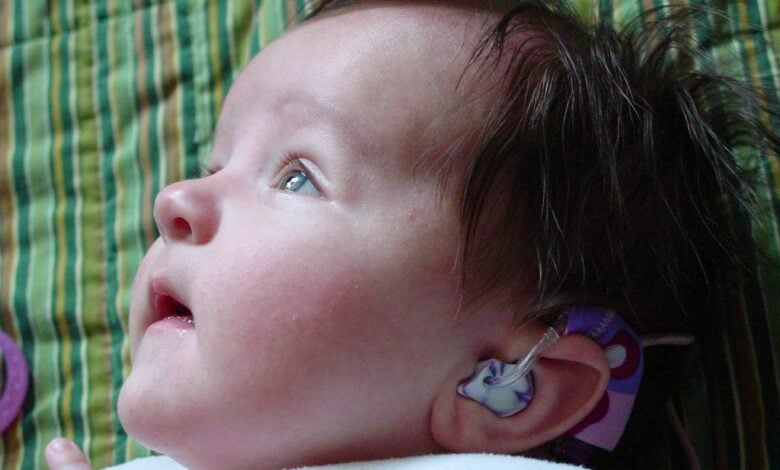Kind: Comprehensive Guide to Hearing Aids for Children

Hearing loss can significantly impact one’s quality of life, but with the right hearing aid, individuals can regain their hearing abilities and actively engage in conversations and activities. However, choosing the right hearing aid can be overwhelming due to the multitude of options available. This guide aims to provide a step-by-step approach to help individuals make informed decisions when selecting a hearing aid that matches their specific needs and preferences.
Understanding Your Hearing Needs:
- Different types and degrees of hearing loss
- Identifying specific hearing situations and environments that pose challenges
- Evaluating personal preferences and lifestyle considerations
Consultation with Hearing Aid Audiologists:
- Importance of seeking professional advice
- Audiological examination and hearing test
- Expert guidance on suitable hearing aid options based on individual needs

Exploring Hearing Aid Styles and Features:
- Overview of different hearing aid styles (behind-the-ear, in-the-ear, in-the-canal, etc.)
- Understanding the pros and cons of each style
- Factors to consider: size, visibility, comfort, and dexterity
Assessment of Technological Features:
- Digital signal processing and sound amplification
- Noise reduction and speech enhancement capabilities
- Connectivity options (Bluetooth, wireless accessories)
Evaluation of Customization and User Controls:
- Programming and adjusting the hearing aid
- User-friendly controls and remote control options
- Customizable settings for different hearing situations
Considering Lifestyle and Special Needs:
- Considering an active lifestyle (water resistance, durability)
- Features for tinnitus management
- Compatibility with glasses, phones, or assistive listening devices
Budget and Insurance Coverage:
- Understanding pricing and financing options
- Researching insurance coverage for hearing aids
- Weighing costs against desired features and benefits
Trial Period and Follow-Up Services:
- Importance of a trial period to assess the performance and fit of the hearing aids
- Follow-up appointments for fine-tuning
- Manufacturer’s or provider’s customer service, warranties, and maintenance programs
Seeking Peer Reviews and Recommendations:
- Online forums, testimonials, and user reviews
- Seeking recommendations from friends, family, or support groups
- Insights and experiences from hearing aid users
Making the Final Decision:
- Weighing all factors and considerations
- Consulting with the hearing aid audiologist for final advice
- Trusting personal intuition and comfort with the chosen hearing aid
Choosing the right hearing aid is a significant decision that can positively impact communication, well-being, and overall quality of life. By following this comprehensive guide, individuals can gain the knowledge and confidence to make an informed decision and find the perfect hearing aid that aligns with their unique hearing needs and lifestyle requirements. Remember to seek professional guidance and expert support throughout the process to ensure optimal hearing health and satisfaction.

Tailored Solutions for Unique Hearing Needs
The hearing requirements of each individual are unique, and finding the right solution to address specific hearing challenges is crucial for effective communication and improved quality of life. This article explores the importance of tailored solutions in the field of hearing aids, highlighting various factors contributing to personalized hearing care and the benefits they offer.
Understanding the Diversity of Hearing Loss:
- Different types and causes of hearing loss
- Varied degrees of hearing impairment
- Effects of hearing loss on communication and daily activities
Comprehensive Hearing Assessments:
- The significance of thorough hearing assessments by qualified professionals
- Diagnostic tests and evaluations to determine the extent and nature of hearing loss
- Identifying individual needs, lifestyle considerations, and communication goals
Customization of Hearing Aid Technology:
- Advanced features and technologies available in modern hearing aids
- Adjusting hearing aid settings for optimal sound amplification and speech clarity
- Personalized programming and adjustment of gain levels based on individual preferences and hearing situations
Styles and Fits for Comfort and Convenience:
- Exploring different hearing aid styles (in-the-ear, behind-the-ear, in-the-canal, etc.)
- Considering physical comfort, dexterity, and cosmetic preferences
- Ensuring a secure fit and proper positioning for maximum effectiveness
Special Programs and Modes:
- Adaptive programs for challenging hearing situations (noisy environments, music events, etc.)
- Telecoil mode for compatibility with loop systems in public spaces
- Tinnitus management features for individuals with accompanying tinnitus
Connectivity and Accessibility Features:
- Wireless connectivity options for seamless integration with smartphones, TVs, and other devices
- Smartphone apps for remote control, personalized adjustments, and data recording
- Accessibility features for individuals with additional needs (visual impairments, limited dexterity.

Ongoing Support and Follow-Up:
- Regular follow-up appointments for fine-tuning and adjustment
- Professional guidance on maintenance, cleaning, and battery management
- Upgrades and advancements in hearing aid technology to adapt to changing needs
Supportive Hearing Solutions and Accessories:
- Exploring additional tools and accessories to complement hearing aids (FM systems, captioning devices, etc.)
- Seeking recommendations for specific situations (lectures, conferences, group conversations)
- Communication strategies and rehabilitation:
- Guiding effective communication techniques for individuals with hearing loss
- Speech therapy and auditory training to improve speech understanding
- Support groups and counseling for emotional well-being and coping with hearing loss
Collaboration with Knowledgeable Professionals:
- The role of experienced audiologists and hearing aid specialists in providing tailored solutions
- Shared decision-making and ongoing communication with the hearing care team
- Ongoing support and resources for long-term hearing health care
Tailored solutions are crucial to meet individual hearing requirements. Through close collaboration with knowledgeable professionals, exploring advanced technologies, and considering lifestyle factors, individuals with hearing loss can find customized solutions that enhance their communication abilities and quality of life. Remember that personalized hearing care is an ongoing journey, and regular follow-up assessments and ongoing support are crucial to ensure optimal hearing health and satisfaction.




